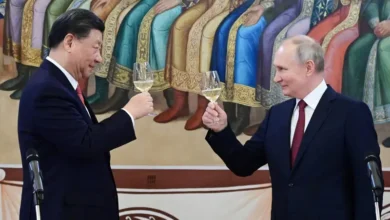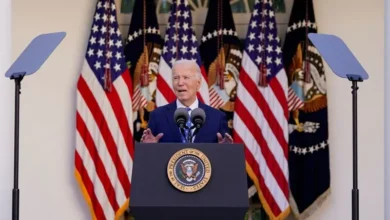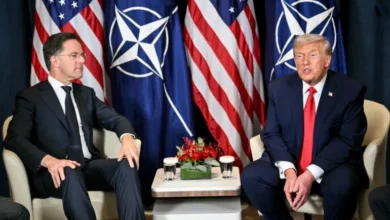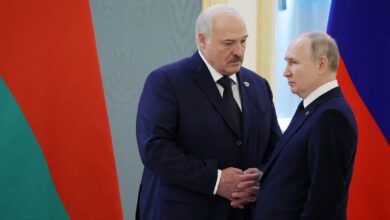As PM, India’s Modi secretly tried to massively cut state funds

Immediately after becoming the prime minister in 2014, Narendra Modi held backdoor negotiations with the Finance Commission of India to significantly cut funds allocated to the country’s states.
However, the head of the commission, an independent constitutional body deciding states’ shares from central taxes, resisted, and Modi had to back off, new revelations show.
The Finance Commission’s firm stance forced the Modi government to hastily redo its maiden full budget in 48 hours and slash funding across welfare programmes since its assumption of retaining a greater portion of the central taxes did not pan out.
At the same time, Modi falsely claimed in Parliament that he welcomed the Finance Commission’s recommendations on the tax portions to be allocated to the states.
These revelations of financial haggling and behind-the-scenes manoeuvring in the making of the federal budget came from BVR Subrahmanyam, the CEO of the government think-tank NITI Aayog. As a joint secretary in the prime minister’s office, he was the liaison in the backdoor negotiations between Modi and the chairman of the Finance Commission, YV Reddy.
This is arguably the first time a top government official in the current Indian government has admitted publicly that the prime minister and his team had tried from the start to squeeze the states’ finances, a concern now repeatedly raised by the states.
Subrahmanyam shared the information while speaking as a panelist at a seminar on financial reporting in India, which had been organised last year by the non-governmental think-tank the Centre for Social and Economic Progress (CSEP).
In his remarks – another first by a government official – he revealed how the federal budgets are “covered in layers and layers of attempt to cover the truth”. He added that he was “sure you will have a Hindenburg who will open up the [Indian government’s] accounts if they are transparent”.Subrahmanyam, the Ministry of Finance and the PMO did not respond to The Reporters’ Collective’s detailed queries.
Per India’s Constitution, an independent Finance Commission, made up of economists and public finance experts, decides what percentage of money the federal government should share with the states from its tax collections, excluding those it labels as “cess” or “surcharges”.
The 14th Finance Commission was set up in 2013. Around the same time, Narendra Modi, as the chief minister of the state of Gujarat, was campaigning for the post of prime minister and made news for asking the commission to give states a 50 percent share of central taxes.
In its report that it submitted in December 2014, the commission recommended that states should get 42 percent of the share of central taxes, up from the 32 percent they had been receiving until then. But Modi, now the prime minister, and his Ministry of Finance, wanted to keep the states’ share of taxes down at 33 percent and a larger portion for the federal government.
Under the constitutional provisions, the government has only two options: accept the Finance Commission’s recommendations or reject them and establish a new commission. It cannot argue, debate or negotiate with it formally or informally.
But the prime minister tried off-record parleys to get the chairman of the Finance Commission, YV Reddy, who was earlier the governor of the Reserve Bank of India, to pare down his recommendations on the revenue share. In his comments on the panel, Subrahmanyam said he was the only other person in that conversation.
This was in breach of constitutional propriety. If the government had succeeded, it would be able to reduce the states’ income while passing the blame onto the constitutional body, the commission.
Subrahmanyam said that a “tripartite discussion between Dr Reddy, me and the prime minister” about the figure took place.
“No Finance Ministry [official or minister],” he stressed, was involved. “Should it be 42 [percent] or 32 [percent] or some number in between? The previous number was 32,” he said, referring to the percentage share of taxes recommended by the 13th Finance Commission.
The conversation lasted two hours, Sabrahmanyam said, but Reddy was unyielding. Subrahmanyam recalled Reddy, telling him in “good south Indian English: ‘Appa [Brother], go and tell your boss [the prime minister] that he has no choice’.”
The government had to accept the Finance Commission’s recommendations of 42 percent.
The Reporters’ Collective verified from an official who was part of the 14th Finance Commission that there had been a delay in accepting the report and conversations about potentially altering it. We corroborated it with another economist who, at that time, was working for the government and in the know about the events.
“It was conveyed that the government had the power to reject the report but not ask for it to be altered. Only once in the past, the federal government has rejected the main report of a Finance Commission and even then it went with the dissenting note that was part of the report. It did not proffer its own devolution numbers,” said the economist, who declined to be named as the discussions involved the prime minister’s office.
But in Parliament, Modi hid his government’s failed attempt to reduce the states’ share of revenues. He told Parliament on February 27, 2015: “To strengthen the nation, we have to strengthen the states… There is a dispute among Finance Commission members. We could have taken advantage of that. We didn’t. But it is our commitment that states should be enriched, should be strengthened. We gave them 42 percent devolution.”
He added, “Some states would not have treasuries big enough to keep all this money,” as members of Modi’s ruling Bharatiya Janata Party (BJP) laughed and applauded.










